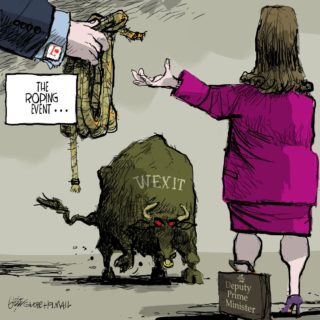If there was any doubt that Russian President Vladimir Putin got what he wanted when he ordered his military into Syria 19 months ago, it was erased as U.S. Secretary of State Rex Tillerson spent much of Wednesday in Moscow, wondering if he would be granted an audience with the Russian leader.
Mr. Putin has pursued an overarching geopolitical goal throughout his long tenure as either Russia’s President or Prime Minister: to see his country treated with the same respect the Soviet Union received during the Cold War, when it was acknowledged as an indispensable player on the international stage.
Until Russia waded into the Syrian conflict in the fall of 2015, its time as a genuine power-broker seemed over. The Kremlin had been unable to prevent a pro-Western revolution right on its doorstep in Ukraine just the year before, and Moscow’s angry reaction – seizing and annexing the Crimean Peninsula, then stirring up separatists in the southeast of the country – was met by Western sanctions and the threat of genuine isolation.
Where Moscow, during the Cold War, had been able to manipulate events as far away as Cuba and Angola, the conflict in Ukraine reduced it to fighting for influence right on its doorstep. Putting his finger right on the wound, then-U.S. president Barack Obama dismissively referred to Russia as a “regional power.”
Then came Mr. Putin’s surprise deployment of Russian troops and warplanes to aid the faltering regime of Syrian President Bashar al-Assad. What seemed at the time like a desperate effort to prevent, or perhaps just delay, the regime’s fall (and to keep Russia’s naval base in northwest Syria – its lone outpost on the Mediterranean Sea – in safe hands), has since flipped global politics on end.
Mr. Putin is now the most influential figure in the bloody struggle for Syria, the only foreign leader who might be able to force Mr. al-Assad to accept a negotiated end to the conflict. That also makes Russia central to resolving the refugee crisis that is shaking the political scenes in many Western countries.
U.S. President Donald Trump may have battered a Syrian air base with cruise missiles last week, but Mr. al-Assad’s air force took off again the next day, knowing it remained under Russia’s protection.
And so, on Wednesday, Mr. Putin could keep Mr. Tillerson waiting and wondering whether he would find time in his schedule to meet the top American diplomat. Mr. Putin has routinely met visiting U.S. secretaries of state since first coming to the presidency in 2000, so not meeting Mr. Tillerson (whose appointment was briefly opposed by U.S. Democrats and Republicans who worried the former Exxon Mobil chief executive had too many ties to Russia) would have been a significant diplomatic snub.
Then, after Mr. Putin did grant him a 75-minute audience, Mr. Tillerson had to sit silently as Russian Foreign Minister Sergey Lavrov used a joint press conference to deliver a prolonged lecture about what he considers the many errors of U.S. foreign policy, from NATO’s 1999 bombing of Yugoslavia through the 2003 invasion of Iraq up to the 2011 bombing of Moammar Gadhafi’s Libya.
Mr. Tillerson, who went into the meeting hoping to convince Mr. Putin that it was no longer in Russia’s interests to support Mr. al-Assad, came away with the minor trophy of having Mr. Putin agree to restart the so-called deconfliction hotline that’s designed to ensure there are no accidental encounters between U.S. and Russian aircraft operating over Syria. Russia announced it was suspending use of the line last week after the U.S. punished the Assad regime for the apparent use of chemical weapons by firing 59 cruise missiles at the airbase from which the attack originated.
But little else was gained. Russia continues to challenge the U.S. assertion that Mr. al-Assad’s forces were behind the April 4 sarin gas attack that killed more than 80 people in the rebel-held town of Khan Sheikhoun. Mr. Tillerson’s suggestion that the Assad family dynasty was coming to an end in Syria was met with Mr. Lavrov’s contention that hastily removing the Syrian leader would clear the way for the Islamic State group or al-Qaeda to seize control.
Underscoring how little had changed during the meeting in Moscow, Russia immediately afterward used its veto power at the United Nations Security Council – for the eighth time since the Syrian civil war began – to block a resolution demanding Mr. al-Assad’s regime hand over its flight logs from April 4 and allow UN investigators access to the airbase from which the Khan Sheikhoun attack was allegedly launched.
Nor were there signs of progress on Ukraine, the other active conflict that Russia and the U.S. are on opposite sides of.
“There is a low level of trust between our two countries,” Mr. Tillerson understated during the press conference. “The world’s two foremost nuclear powers cannot have this kind of relationship.”
What was most notable about the Tillerson-Lavrov press conference was how much it resembled the terse exchanges Mr. Lavrov had with Mr. Tillerson’s predecessor, John Kerry. For all the allegations of Russian interference in the U.S. presidential election, there’s little evidence so far that the election of Mr. Trump has changed much in the relationship between Washington and Moscow.
Except that, on TV news networks around the world, all the talk on Wednesday was about how Mr. Putin would treat the visiting American diplomat, and what Russia might do next in Syria and Ukraine.
Russia is back as the centre of attention. That, in many ways, is all Mr. Putin ever wanted.
MARK MACKINNON
LONDON — The Globe and Mail
Published Wednesday, Apr. 12, 2017 5:21PM EDT
Last updated Thursday, Apr. 13, 2017 7:08AM EDT

